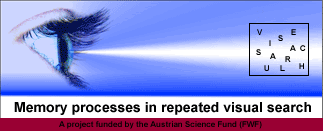 Visual search often involves searching the same environment, consecutively, for a number of different targets. During this grant we investigate the extent to which search benefits from such previous exposure. In our experiments participants search the same display for consecutive targets. Typically, manual responses are faster in the second search than the first search. However, there is no additional benefit for the third search. Eye movement recordings demonstrate that the time necessary to find a target letter depends on when that letter was last fixated in the previous search even when distance was controlled for. This fixation recency effect lasts for about four fixations. These results provide evidence for a short-term memory store in this kind of visual search.
Visual search often involves searching the same environment, consecutively, for a number of different targets. During this grant we investigate the extent to which search benefits from such previous exposure. In our experiments participants search the same display for consecutive targets. Typically, manual responses are faster in the second search than the first search. However, there is no additional benefit for the third search. Eye movement recordings demonstrate that the time necessary to find a target letter depends on when that letter was last fixated in the previous search even when distance was controlled for. This fixation recency effect lasts for about four fixations. These results provide evidence for a short-term memory store in this kind of visual search.
The main objective of the project is to investigate what kinds of short-term memory are responsible for this effect. This objective will be achieved by conducting three sets of closely related experiments using eye-tracking techniques.
Team:
- Margit Höfler
- Christof Körner
- Jürgen Pretsch
- Susanna Haberschek